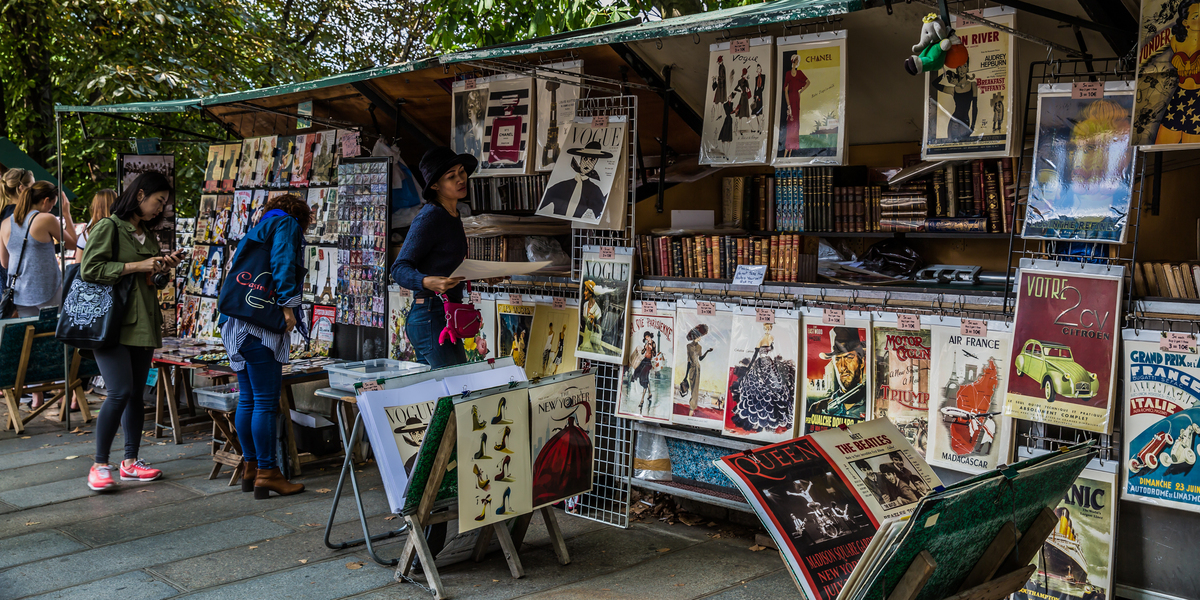The Summer Olympics will be held in Paris between July and August next year. Exceptionally, the opening ceremony was not organized in a stadium but along the Seine, the river that crosses the city: thousands of Olympic athletes will be boarded on 160 different boats and spectators will be able to admire the spectacle from the banks of the river. This puts one of the most characteristic commercial establishments in the French capital in great difficulty: i booksellersor the booksellers who sell used and old books in the green metal newsstands arranged along the banks of the river, from the quai de l’Hôtel de Ville to the quai du Louvre on the right bank of the river and from the quai de la Tournelle to the quai Voltaire on the bank left.
The municipal police ordered the booksellers to move 170 of the 227 stands for the weeks of the Olympics, for logistical and safety reasons. In fact, the police fear that the newsstands could be used to hide explosive devices. However, some booksellers believe that the reason is more purely practical and partly aesthetic, given that their presence would certainly make it more difficult for spectators to attend the event from the banks of the river.
Even if it would be a temporary move, i booksellers for now they say they have no intention of doing so, especially since the newsstands are ancient and delicate, and they fear that moving them could permanently damage them. The booksellers are collecting signatures against this ordinance: if the petition doesn’t work, some of them say they are ready to barricade themselves in front of their newsstands to prevent them from being dismantled.
«Mayor Anne Hidalgo wants to celebrate Paris and its monuments with the Olympics, but booksellers are an integral part of Paris. Wanting to make us disappear is as absurd as dismantling the Eiffel Tower or Notre-Dame de Paris! We’ve been here for four hundred and fifty years.” told to The world Jérôme Callais, president of the cultural association of the booksellers Paris.
That of the booksellers it is a very long story, which is conventionally traced back to the end of the sixteenth century, when itinerant vendors sold the so-called book, second-hand booklets, in wooden carts, in large pockets sewn into coats or in wooden boxes that they wore around their necks or arms. The first definition of bookseller instead it is found in the Dictionary of Trévoux of 1752: it indicated «the one who sells old books, books» and included only the male gender because it was a job for men only. In 1789 it was also included in the dictionary of the Académie Française, which reported both genres for the first time in its eighth edition, released in 1932.
Throughout the eighteenth century and during the empire of Napoleon i booksellers they became a point of reference for writers, bibliophiles, scholars and students, and during the 19th century their presence strengthened until it definitively established itself in the city and literary scene. In the middle of the century there were about 68 owners of 1,020 stands leaning on more than a kilometer of parapets, offering a total of 70,000 books: as many as 1,500 were being sold a day. In 1866, Baron Haussmann, at the head of a large restructuring plan in Paris, attempted to remove them to make the Seine riverside cleaner: the booksellers they asked for the mediation of a well-known jurist who turned to the emperor Napoleon III and convinced him to grant the sellers permission to stay. Starting in 1891 they were allowed to leave the newsstands on the parapet even at night, instead of carrying them back and forth in the morning and evening as had been established up to that point. Their current shape and size was established by law in the 1930s, as was the fact that they must be painted the same shade of green as the Paris Metro.
In recent years, i booksellers they didn’t do very well: the protests of the yellow vests first and the drop in tourism due to the pandemic then led to a decrease in their earnings, even if the city of Paris grants them the public space on which they park for free. Thierry Leneveu, a bookseller with a stall near the Louvre, he said al New York Times who understands the need for increased security during the Olympics, but believes the police’s request to move newsstands without compensation is excessive.
The mayor of Paris Anne Hidalgo had initially tried to find an alternative security plan to allow the newsstands to remain in place, but says she has not been able to do so: she has now promised that the city will take care of covering the costs necessary to repair newsstands identified as particularly delicate, in case they should be damaged during the move. It is not yet clear where they will be moved, if they will be moved: the idea of creating a “village of booksellers” to allow them to benefit from the strong influx of tourists who will arrive in the city for the Olympics, or alternatively to place them temporarily along the canal that goes towards the Bastille.
